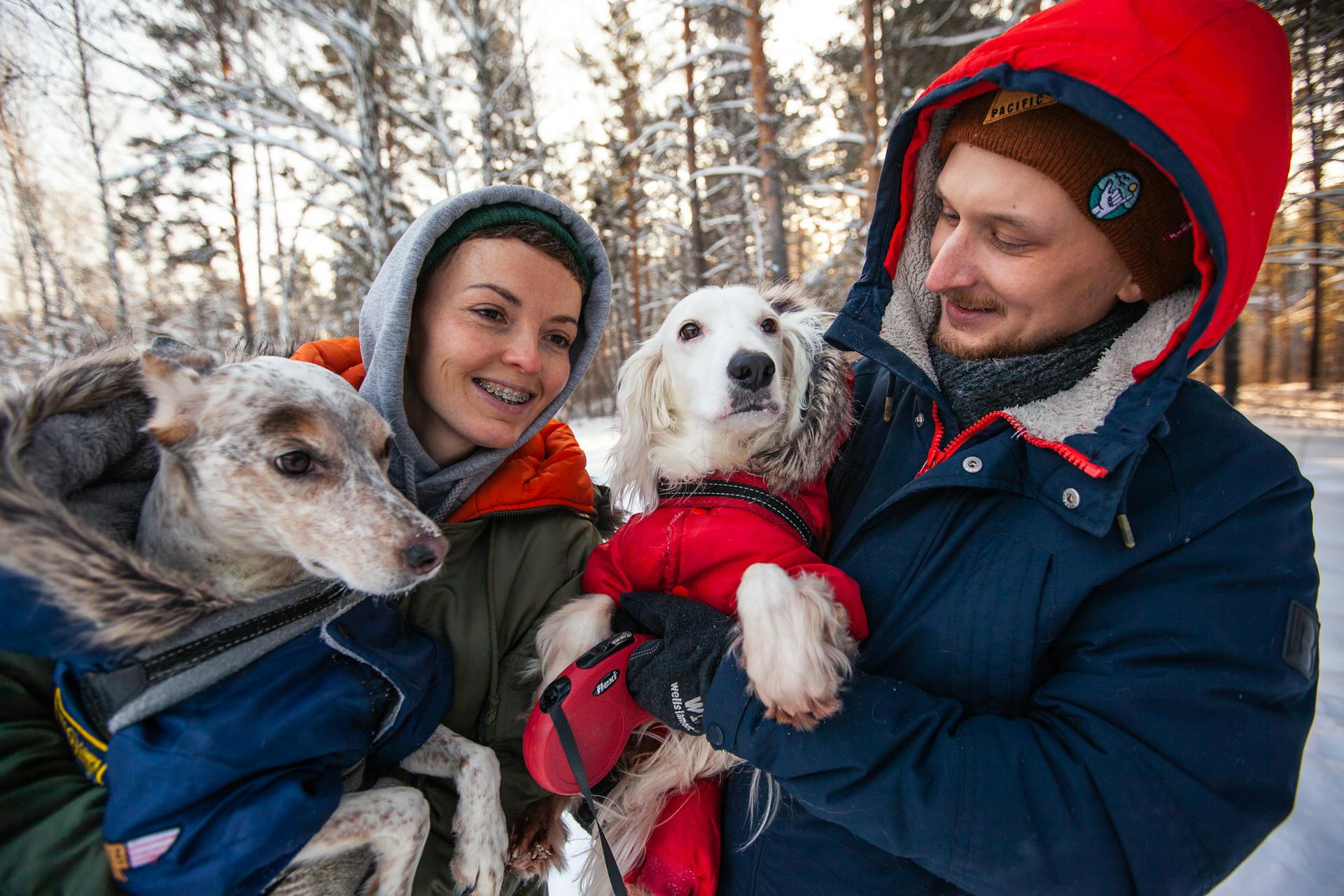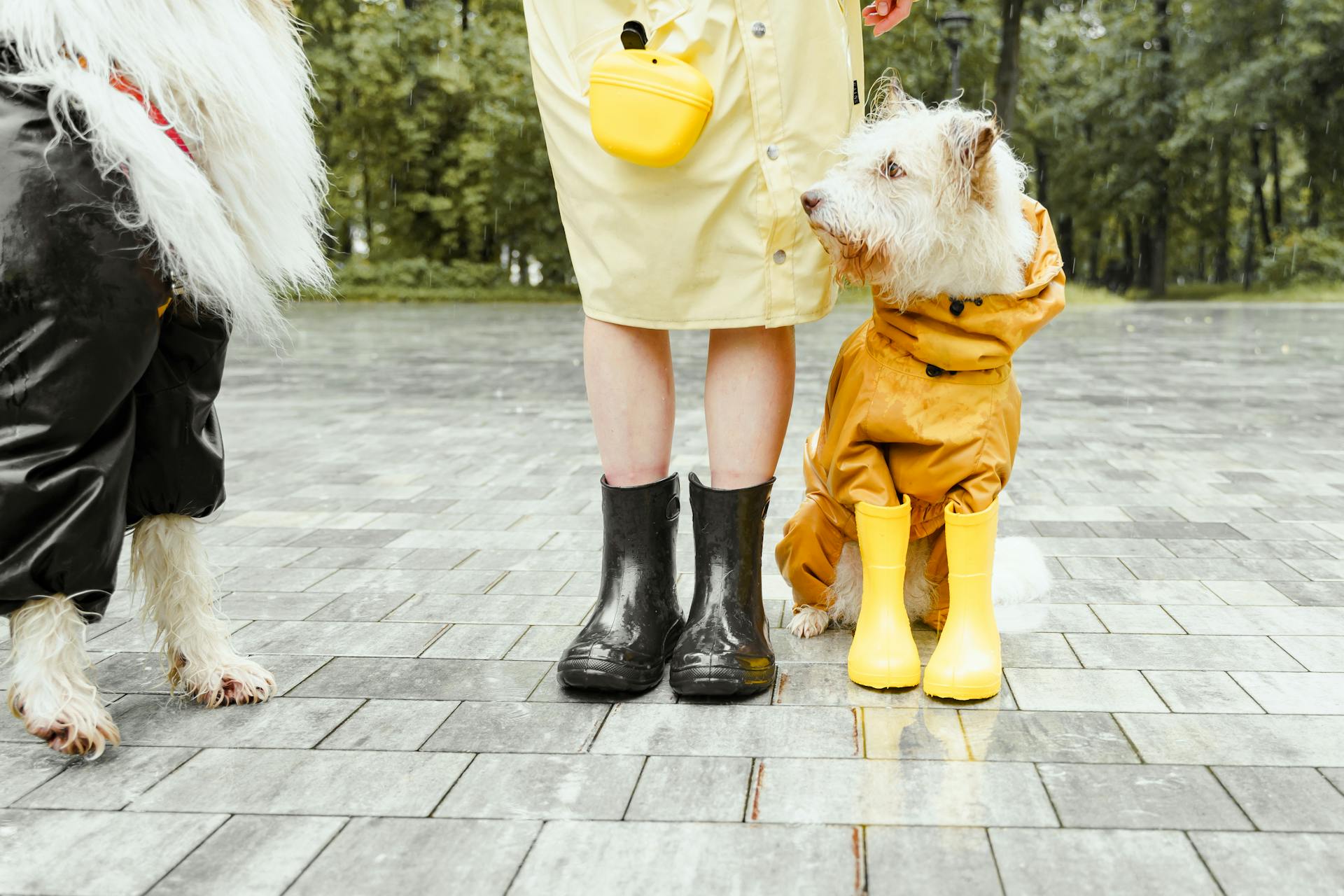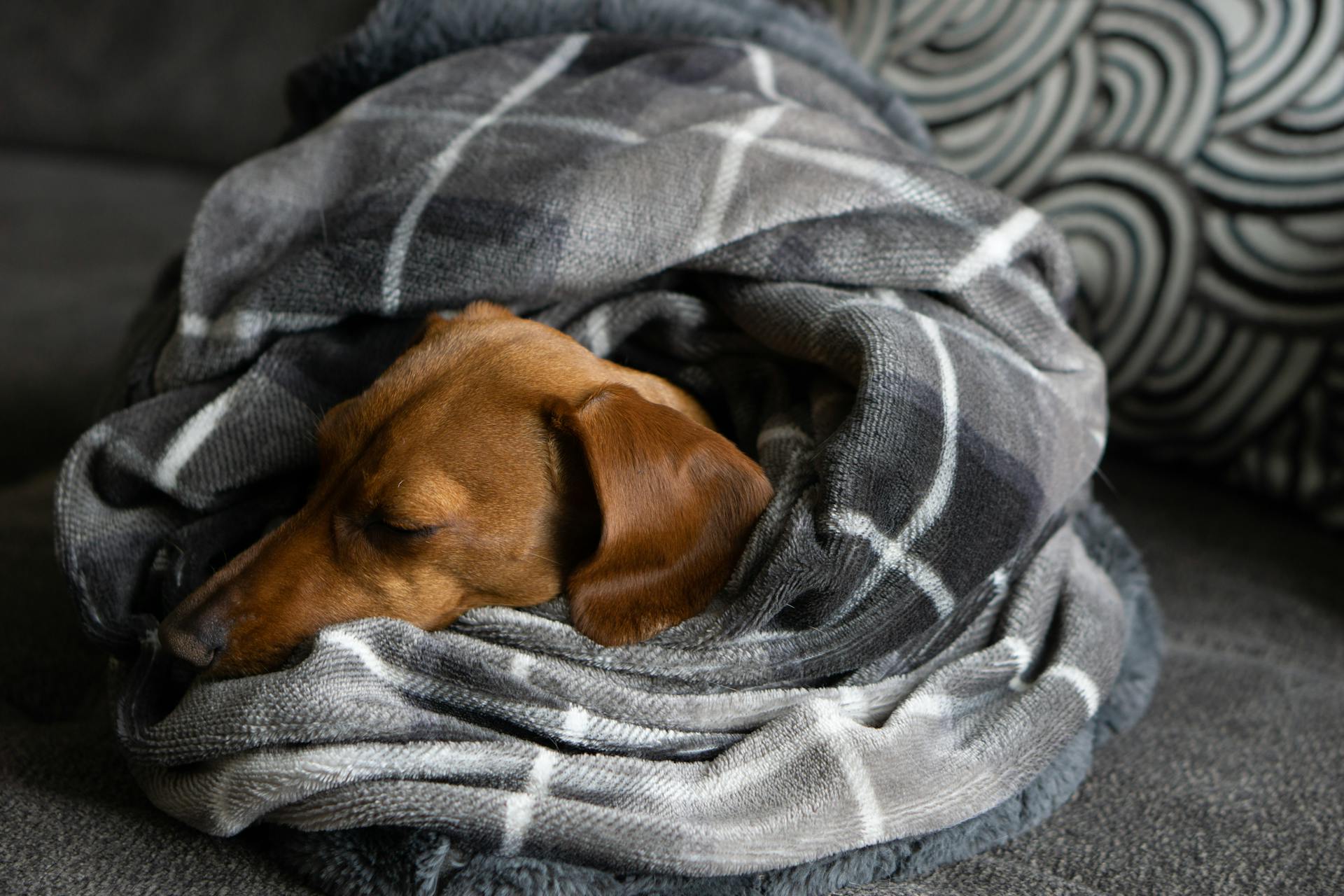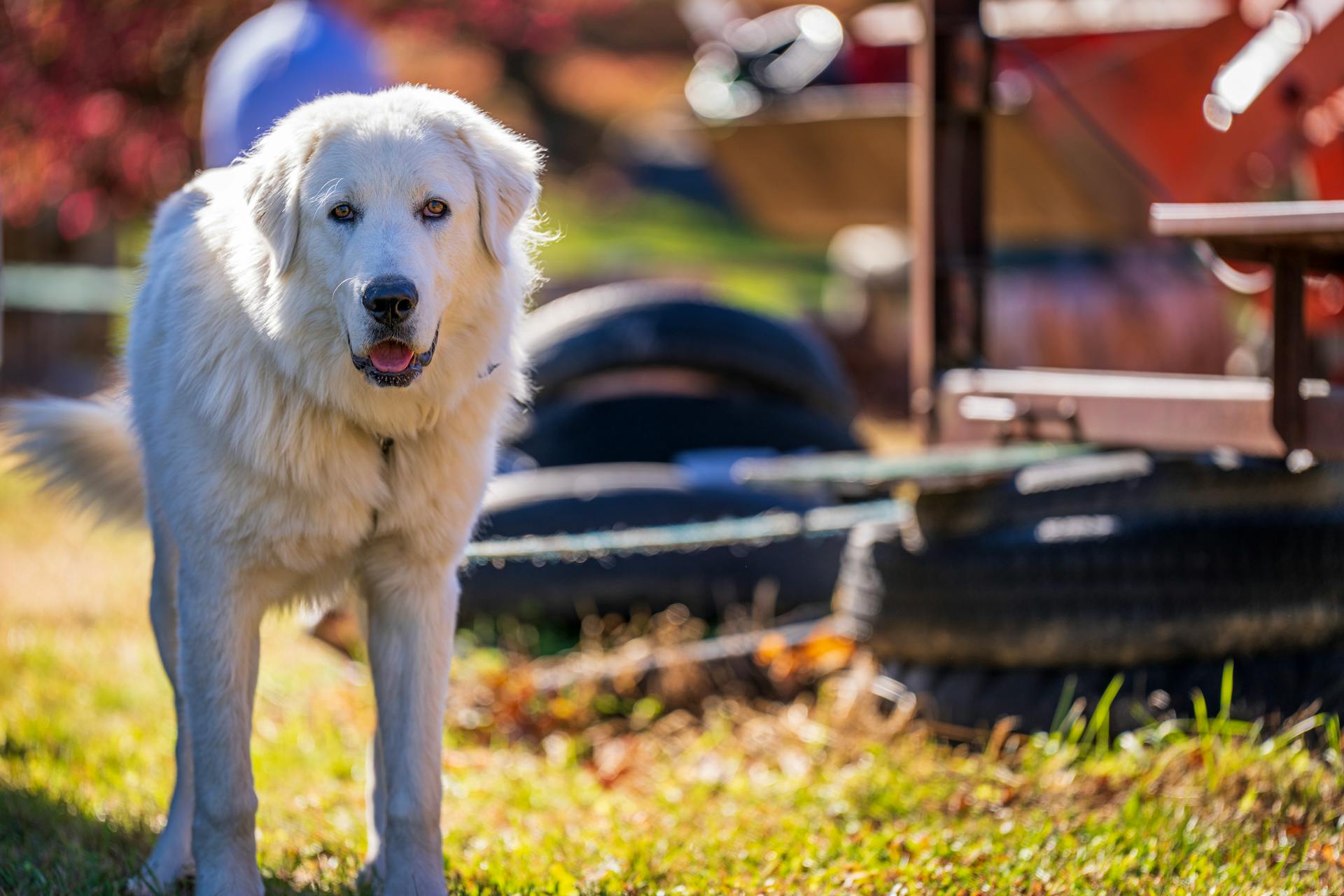
If your Great Pyrenees isn't eating, it's not just a matter of them being picky - it's a sign that something's amiss.
One of the most common causes of a Great Pyrenees not eating is dental issues. According to research, dental problems such as gum disease or tooth abscesses can cause pain while eating, leading to a decrease in appetite.
Changes in environment or routine can also affect your Great Pyrenees' appetite. For example, a new pet or family member can cause stress, leading to a loss of appetite.
It's essential to monitor your Great Pyrenees' water intake, as dehydration can exacerbate a decrease in appetite.
Suggestion: Do Dogs Go through Phases of Not Eating
Great Pyrenees Information
Great Pyrenees are not typically fussy eaters, but they can show disinterest in their food at times.
Their size and breed characteristics mean they have distinct dietary needs, which can sometimes lead to deviations from their usual eating patterns.
Noticing these deviations is crucial, as they could indicate underlying health or behavioral issues.
Great Pyrenees usually have a good appetite, but their laid-back nature can make them seem less interested in food.
Encouraging them to eat is essential for their well-being, and there are practical tips that can help.
Reasons for Appetite Loss
Environmental and routine changes can significantly impact your Great Pyrenees' appetite. This can be due to changes in living arrangements, family dynamics, or even alterations in feeding schedules.
Dental problems, such as tooth decay, gingivitis, or oral injuries, can make eating painful for your dog. Regular dental check-ups are crucial for maintaining oral health.
Health issues, ranging from minor ailments like an upset stomach to more severe conditions such as kidney disease or cancer, can lead to a loss of appetite. It's vital to monitor for other signs of illness.
Dietary preferences and food quality can also be a reason for appetite loss. Great Pyrenees might prefer certain flavors or textures over others.
Some common reasons for appetite loss in dogs include:
- Dental disease or pain in their mouth
- Upset stomach
- Serious health condition
- Stress
- Fear
- Issues with food
Stress and fear can also cause appetite loss in dogs. A change to your dog's environment, such as a new family member or the loss of a family member, can cause stress. Sudden events like fireworks or a stranger visiting can also cause fear.
The food itself may be the problem if it's stale, expired, or spoiled. Some dogs may eat just about anything, but others are more particular about their food.
Intriguing read: Homemade Weight Loss Food for Dogs
When to Consult a Vet
If your Great Pyrenees refuses to eat for more than 48 hours, it's time to consult a veterinarian. This is a crucial sign that indicates a need for professional advice.
If the loss of appetite is accompanied by other symptoms such as vomiting, diarrhea, lethargy, or noticeable weight loss, it's time to seek veterinary care. These symptoms can be a sign of a serious underlying health issue.
Great Pyrenees with pre-existing health issues should have any change in eating habits promptly addressed with a vet. This is especially important if your dog is already dealing with a chronic health condition.
If your dog refuses to eat their food for 24 hours or more, you need to take your pup to the vet. A vet can run some tests on your dog to determine blood diseases and the possible cause of their appetite loss.
Here are some key signs that indicate a need for veterinary care:
- Extended periods of not eating (more than 48 hours)
- Loss of appetite accompanied by other symptoms such as vomiting, diarrhea, lethargy, or noticeable weight loss
- Chronic health conditions with changes in eating habits
- Refusal to eat food for 24 hours or more
Consulting a veterinarian at the right time can help prevent further complications and ensure your dog receives the necessary care to recover from their condition.
Diet and Environment Management
Maintaining a consistent feeding routine is crucial for your Great Pyrenees' sense of security and routine, encouraging them to eat. This can be achieved by establishing and sticking to a regular feeding schedule.
Providing a balanced diet that suits the nutritional needs of your Great Pyrenees is essential. Consult your veterinarian for diet recommendations based on their health and age requirements.
A calm and comfortable place to eat can help your Great Pyrenees feel more relaxed during mealtimes. Ensure they have a quiet, comfortable dining place away from high-traffic areas or loud noises.
Here are some tips for creating a suitable eating environment based on your dog's personality:
If your Great Pyrenees still won't eat, try warming bone broth and pouring it over their meal, or offer tempting foods like canned sardines, green tripe, raw goat's milk, or kefir.
Switching to High-Quality Dog Food
Establishing a consistent feeding routine is key to encouraging your Great Pyrenees to eat, so make sure to stick to a regular schedule.
A balanced diet that suits your Great Pyrenees' nutritional needs is essential, so consult your veterinarian for diet recommendations based on their health and age requirements.
Creating a comfortable eating space away from noise and family commotion can help your Great Pyrenees feel more relaxed during mealtimes.
If your Great Pyrenees consistently lack interest in their current nutrition, consider switching to a different brand of high-quality dog food rich in nutrients and suitable for large breeds.
Gradually transitioning to the new food over several days is essential to prevent digestive upset.
Here are some tips to keep in mind when switching to a new dog food brand:
- Look for high-quality dog food with a balanced mix of nutrients.
- Choose a brand suitable for large breeds like Great Pyrenees.
- Gradually transition to the new food over several days to prevent digestive upset.
Creating a Comfortable Environment
Establishing a consistent feeding routine can give your dog a sense of security and routine, encouraging them to eat.
Providing a balanced diet that suits the nutritional needs of your Great Pyrenees is essential, and consulting your veterinarian for diet recommendations is a good idea.
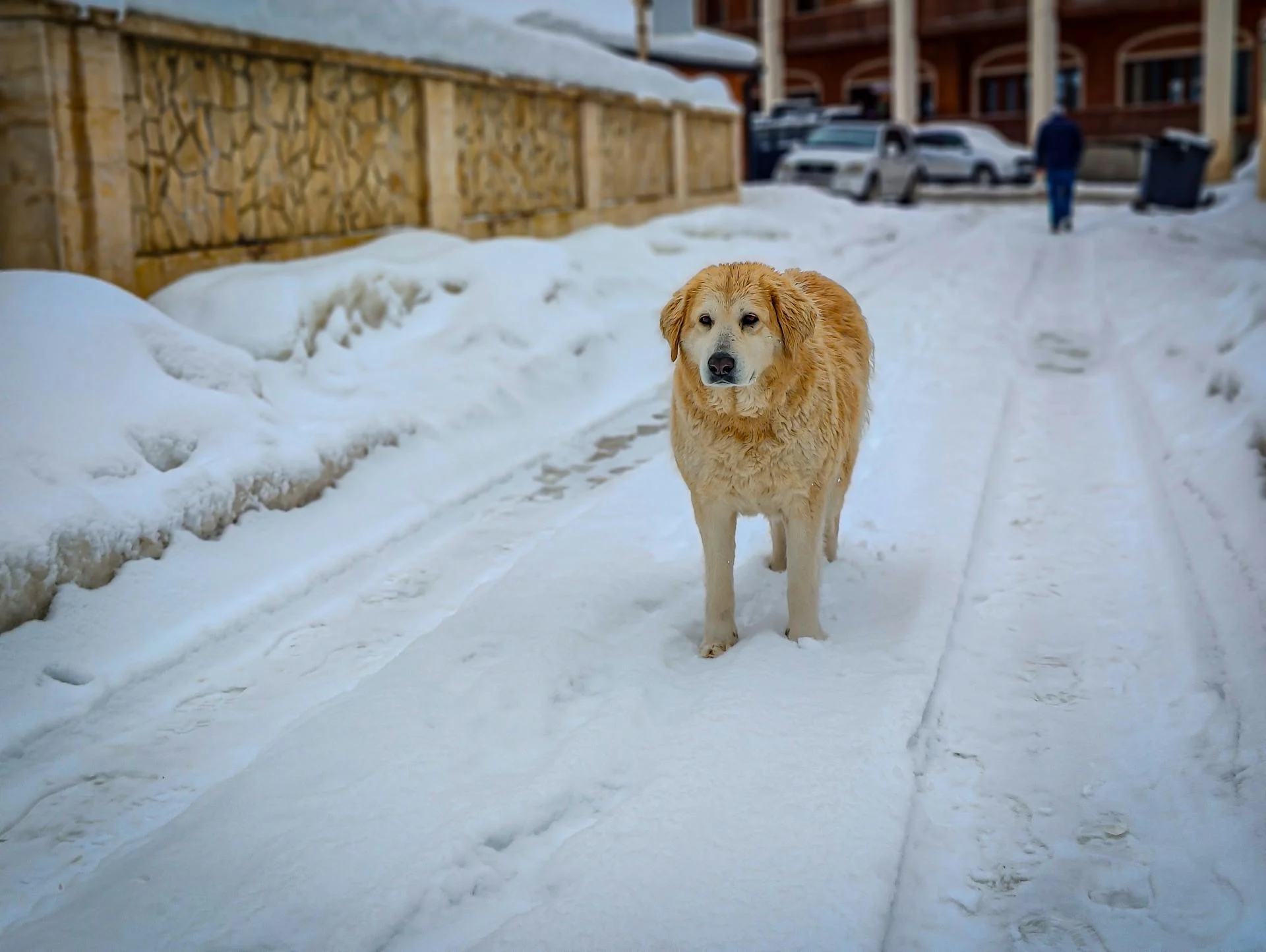
A calm and comfortable place to eat, away from noise and family commotion, can help your Great Pyrenees feel more relaxed during mealtimes.
A quiet, comfortable dining place away from high-traffic areas or loud noises is ideal for your Great Pyrenees' eating environment.
You can try playing to your dog's personality by switching up where they usually eat, depending on whether they're nervous or sociable.
Here are some feeding environment options based on your dog's personality:
Consistency in feeding location and schedule can also help establish a comfortable routine that encourages regular eating habits.
Great Pyrenees Care
Great Pyrenees are known for their gentle nature, and they usually aren't fussy eaters. However, if your Great Pyrenees is showing disinterest in their food, it's essential to notice the deviation from their usual eating patterns, as it could indicate underlying health or behavioral issues.
Great Pyrenees have distinct dietary needs due to their size and breed characteristics, so ensuring they receive the right nutrition is crucial.
A laid-back approach to food is common in Great Pyrenees, but it's still important to encourage them to eat to maintain their well-being.
Noticing changes in your Great Pyrenees' eating habits can help you identify potential health or behavioral issues early on.
A different take: Great Pyrenees Health Problems
Veterinary Care
If your Great Pyrenees' lack of appetite persists beyond 48 hours, it's time to consult with a veterinarian.
Monitoring your dog's weight changes is crucial, so keep a journal to track monthly weight changes, just like I do.
A journal also helps you keep notes on your dog's lumps and bumps, which can be helpful for the vet.
Pet insurance claims can be a hassle, but keeping a journal can make the process smoother by documenting any associated vet bills.
Expand your knowledge: Homemade Dog Food Recipes Vet Approved for Large Dogs
Frequently Asked Questions
Are Great Pyrenees known to be picky eaters?
Yes, Great Pyrenees are known to be picky eaters due to their sensitive stomachs and unique dietary needs. They often require a customized feeding schedule and amount of food.
How much should a Great Pyrenees eat a day?
A Great Pyrenees' daily food intake varies by weight and activity level, typically ranging from 4-6 cups of dry food per day. Consult with a veterinarian to determine the best feeding plan for your dog.
What do vets do when a dog won't eat?
Vets may prescribe medication to stimulate appetite in dogs that won't eat, and also treat the underlying cause of the issue. This can help get your dog eating again and address any underlying health concerns.
Sources
- https://iheartdogs.com/why-is-my-great-pyrenees-not-eating/
- https://talk.newagtalk.com/forums/thread-view.asp
- https://agprescue.org/news/caring-for-your-pyr/foods-to-avoid-with-your-great-pyrenees/
- https://www.holistapet.com/blogs/dog-nutrition/canine-wont-eat-his-food-but-will-eat-his-treats
- https://keepthetailwagging.com/what-to-do-if-your-healthy-dog-wont-eat/
Featured Images: pexels.com
